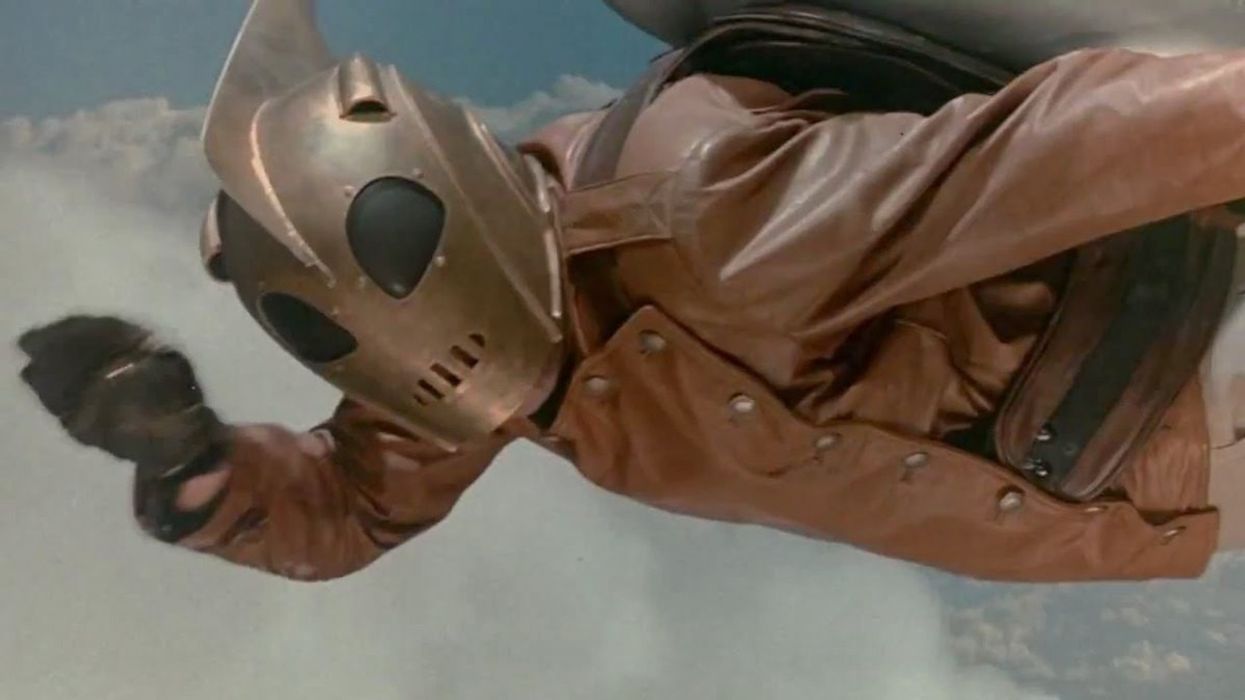How Did 'The Rocketeer' Become Such a Beloved Film?
Joe Johnston loves showcasing the American dream.

We're in the middle of a superhero bubble where so many blockbusters coming out are part of that Disney or DC wave of comic book movies that take on the most famous personas of the funny pages. When I think about my favorite comic book films, I think about the landmarks of the genre, the originals who were pillars holding the temple, like Tim Burton's Batman and the original Superman: The Movie.
But I also think about The Rocketeer.
When I was a kid, I wore out my VHS copy of The Rocketeer. It was a movie about underdogs, geniuses, and someone brave enough to take a stand. The hero didn't have powers, he just had a rocket strapped to his back, a gal he loved, and the desire to kick some Nazi ass.
I saw The Rocketeer long after it made its debut in theaters, and it seems like many people in my generation did as well. While it made almost $50 million at the box office, reviews called it old-fashioned and decried its sentimentality. And those might be the two reasons I loved it so much. And I know I'm not alone in that fact.
Check out this video from The Royal Ocean Film Society and let's talk after the jump.
So, How Did The Rocketeer Become Such a Beloved Film?
The simple answer to the question is that Disney Channel played the movie over and over again for a good portion of the 90s, capturing the hearts and minds of the kids who missed it in theaters. Those kids got older, showed it to their kids, and so on.
But it's not just about that—somewhere along the line, the hopeful attitude and storytelling within the movie came back into fashion. We had seen enough cynicism, and the effervescent quality of this story bubbled to the surface.
Directed by Joe Johnston, he took his almost Spielbergian-like qualities and made a movie about the American dream. It was Hollywood-adjacent, about men who had visions of flying. We had characters who were dreamers and romantics. Even Howard Hughes in this film had a vision and wasn't washing his hands all the time. Based on the graphic novel by Dave Stevens, the movie was an optimistic look at life where everyone in America came together to stop the Nazis in the final act.
This was all supported by a wondrous James Horner score.
I love so many things about this movie, but I will admit I have come to see some of the flaws. While as a kid I loved seeing the art deco sets and beautiful people, I can't watch it today without thinking about how an entire diverse population of non-white people in Los Angeles gets completely ignored within the storyline. If this is truly a pastiche of the American dream, which I believe it is, I wish the movie highlighted the stories of more Americans. but that's a retroactive note. We can't make a 1991 movie live up to the standards of 2021.
We can learn from it, though. I think the main takeaways of this movie are lean storytelling, buying into the theme, and not being afraid to embrace a tone you haven't seen in modern movies. Johnston has done this across his films. He's one of the best directors I have seen who really digs at the premise of the movie and gives the audience what they want out of it.
What does your audience want? How can you give it to them while still surprising them along the way? That's the challenge of writing and directing. Are you up to it?
Let us know what you think of The Rocketeer in the comments.
Source: The Royal Ocean Film Society
- All the Upcoming Movie Sequels You Need to Watch ›
- Every Movie and TV Show Coming to Disney+ (So far) ›
- VFX Supervisor Aaron Wright Dishes On the Time Travel Secrets of 'My Old Ass' | No Film School ›













